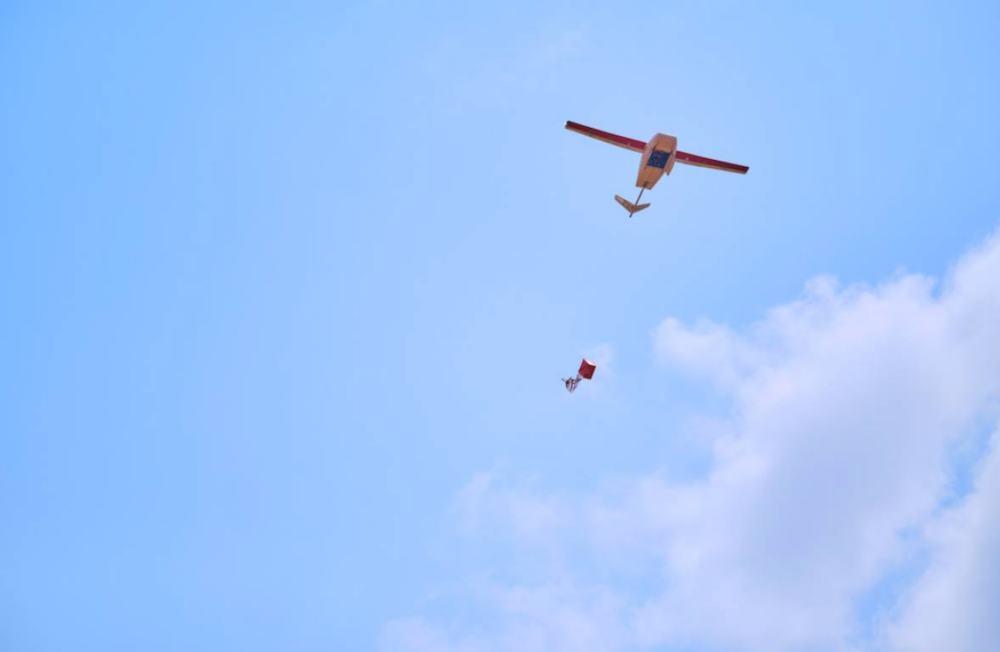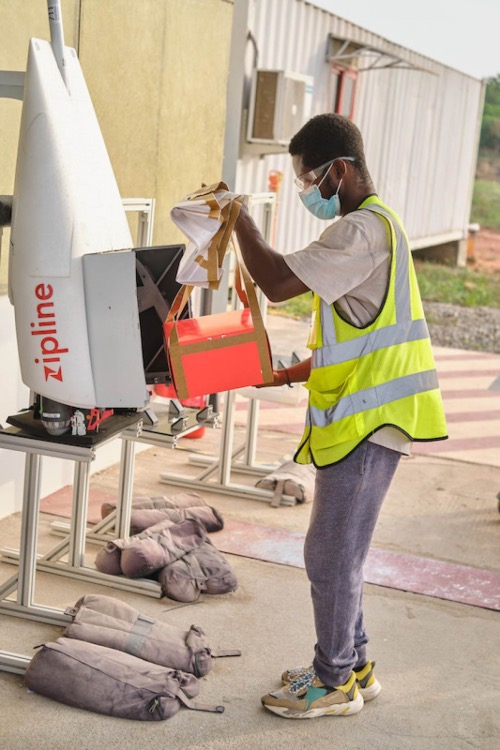Villagers in remote corners of rural India could start seeing curious flying objects in the skies as health experts test out drones to deliver COVID-19 vaccines to isolated communities amid a deadly surge in coronavirus cases.
The southern state of Telangana, which is part of the World Economic Forum’s Medicine from the Sky project along with government thinktank NITI Aayog and Apollo Hospitals, will run a trial and then launch COVID-19 vaccine deliveries with drones.

A drone enroute to deliver COVID-19 vaccines in Ghana. PICTURE: Thomson Reuters Foundation/Samuel Moore via Gavi
Karnataka, another southern state, is also looking at drone deliveries of COVID-19 vaccines, while the Indian Council of Medical Research has been granted permission to do a broader study on the issue.
“These permissions [are] intended to achieve the dual objectives of faster vaccine delivery and improved healthcare access by ensuring primary healthcare delivery at the citizen’s doorstep,” the civil aviation ministry said.
The ministry regulates the use of drones, also known as unmanned aerial vehicles, because they are seen as a national security issue.
Across the world, drones have been delivering medical goods for several years now, with charity Doctors Without Borders (MSF) testing them during a tuberculosis outbreak in Papua New Guinea in 2014, and to help tackle Ebola in Liberia.
Rwanda used Zipline drones to deliver blood to rural clinics, with the vehicles now carrying about 35 per cent of the blood transfusion supply outside the capital.
During the coronavirus pandemic, Zipline drones have also been dropping off AstraZeneca’s COVID-19 vaccines in Ghana, and will soon start delivering them in Rwanda and the United States, with Nigeria also planned for later this year.
Gavi, the global vaccine alliance, has tied up with California-based Zipline and the UPS Foundation to deliver vaccines in areas “without the infrastructure for conventional delivery“, said Moz Siddiqui, head of Gavi’s private sector partnerships and innovation.
“With every dose of the COVID-19 vaccine being so important, it is critical to ensure that countries have the support and tools to deliver vaccines effectively and efficiently to those who need them,” he told the Thomson Reuters Foundation.
“Drones enable us to supplement more traditional delivery systems. They are a great, unique solution to a problem faced by multiple countries.”

A drone being prepared to deliver COVID-19 vaccines in Ghana. Thomson Reuters Foundation/Samuel Moore via Gavi
The global market for drone services – from product delivery to aerial photography, mapping, environmental monitoring and storm tracking – is forecast to reach $US64 billion by 2025, up from just $US4.4 billion in 2018.
There was a surge in interest in drones last year as the pandemic kept people home, and again as vaccines were rolled out.
German start-up Wingcopter is working on trial projects in Africa and South-East Asia to deliver COVID-19 vaccines.
North American company Draganfly is also transporting COVID-19 vaccines, while start-up Volansi has partnered with drugmaker Merck to deliver vaccines in rural North Carolina.
The pandemic has highlighted the challenge in reaching rural and poorer communities, and the role drones could play in improving access to healthcare and medical supply chains, said Vignesh Santhanam at the WEF’s aerospace and drones unit in India.
The Medicine from the Sky initiative, launched in 2019, expects to kick off its trials in Telangana state soon, and plans to expand its network within the state before partnering with other states, he said.
“We have kept our focus on vaccine delivery, although we see tremendous potential for other uses including transporting blood, medicines, and other essential medical goods,” he added.
India’s overall death toll from COVID-19 crossed 300,000 on Monday, as it reported 4,454 deaths over the last 24 hours. Its daily coronavirus infections rose by 222,315. The South Asian country’s total coronavirus cases are now at 26.75 million, while total fatalities are at 303,720, according to health ministry data.
Cases have overwhelmed the country’s rural areas, where ill-equipped health centres, staff shortages and long journeys have made it harder for villagers to access treatment and vaccines.
Drones are particularly useful in places where road connectivity and refrigerated transport are a challenge.
“The vision is to ensure healthcare equity for rural areas,” said Jayesh Ranjan, Telangana’s principal secretary of information technology and industries.
While it may take a while for drone deliveries in healthcare to scale up in India, new regulations will help, Santhanam said.
“COVID has accelerated the use of drones in healthcare around the world. In India, it has created a new urgency for the public and private sector to collaborate on drone applications,” he added.






